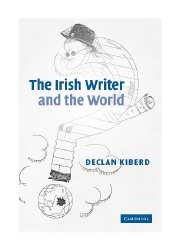Book contents
- Frontmatter
- Contents
- Acknowledgements
- A note on the text
- 1 Introduction
- 2 The fall of the Stage Irishman (1979)
- 3 Storytelling: the Gaelic tradition (1978)
- 4 Writers in quarantine? The case for Irish Studies (1979)
- 5 Synge, Yeats and bardic poetry (2002)
- 6 George Moore's Gaelic lawn party (1979)
- 7 The flowering tree: modern poetry in Irish (1989)
- 8 On national culture (2001)
- 9 White skins, black masks: Celticism and Négritude (1996)
- 10 From nationalism to liberation (1997)
- 11 The war against the past (1988)
- 12 The Elephant of Revolutionary Forgetfulness (1991)
- 13 Reinventing England (1999)
- 14 Museums and learning (2003)
- 15 Joyce's Ellmann, Ellmann's Joyce (1999)
- 16 Multiculturalism and artistic freedom: the strange death of Liberal Europe (1993)
- 17 The Celtic Tiger: a cultural history (2003)
- 18 The city in Irish culture (2002)
- 19 Strangers in their own country: multiculturalism in Ireland (2001)
- Index
- References
4 - Writers in quarantine? The case for Irish Studies (1979)
Published online by Cambridge University Press: 22 September 2009
- Frontmatter
- Contents
- Acknowledgements
- A note on the text
- 1 Introduction
- 2 The fall of the Stage Irishman (1979)
- 3 Storytelling: the Gaelic tradition (1978)
- 4 Writers in quarantine? The case for Irish Studies (1979)
- 5 Synge, Yeats and bardic poetry (2002)
- 6 George Moore's Gaelic lawn party (1979)
- 7 The flowering tree: modern poetry in Irish (1989)
- 8 On national culture (2001)
- 9 White skins, black masks: Celticism and Négritude (1996)
- 10 From nationalism to liberation (1997)
- 11 The war against the past (1988)
- 12 The Elephant of Revolutionary Forgetfulness (1991)
- 13 Reinventing England (1999)
- 14 Museums and learning (2003)
- 15 Joyce's Ellmann, Ellmann's Joyce (1999)
- 16 Multiculturalism and artistic freedom: the strange death of Liberal Europe (1993)
- 17 The Celtic Tiger: a cultural history (2003)
- 18 The city in Irish culture (2002)
- 19 Strangers in their own country: multiculturalism in Ireland (2001)
- Index
- References
Summary
If we once admit the Irish-literature-is-English idea, then the language movement is a mistake. Mr Yeats' precious ‘Irish’ Literary Theatre may, if it develops, give the Gaelic League more trouble than the Atkinson–Mahaffy combination. Let us strangle it at its birth. Against Mr Yeats personally we have nothing to object. He is a mere English poet of the third or fourth rank and as such he is harmless. But when he attempts to run an ‘Irish’ Literary Theatre it is time for him to be crushed.
Patrick Pearse, Letter to the Editor, An Claidheamh Soluis, 20 May 1899When Patrick Pearse wrote in 1899 that the concept of an Irish national literature in the English language was untenable, he cannot have reckoned with the emergence of a writer such as Synge. Pearse's doctrinaire statement became a major policy of the Gaelic League and this led to an artificial division between writing in Irish and English on the island. Such a division persists in Irish schoolrooms to this very day, where Anglo-Irish literature is studied in one class and literature in the Irish language is considered in another. The short stories of Liam O'Flaherty are examined in courses on the Anglo-Irish tradition, with no reference to the fact that many of them were originally written in the native language. Similarly, the Irish-language versions of such stories are studied in a separate class, with no attempt to appraise the author's own recreation of these works in English.
- Type
- Chapter
- Information
- The Irish Writer and the World , pp. 52 - 69Publisher: Cambridge University PressPrint publication year: 2005



